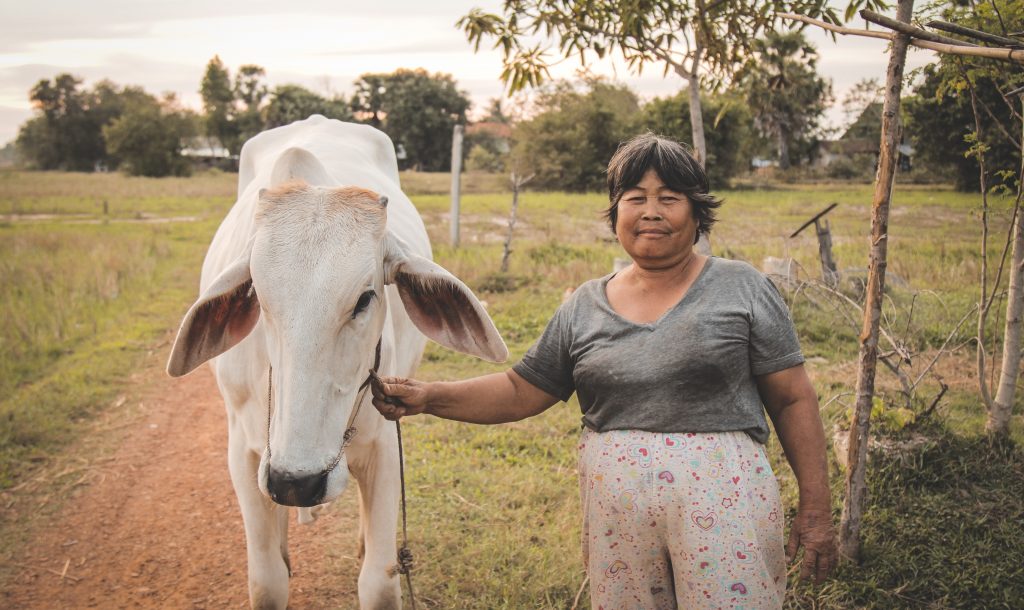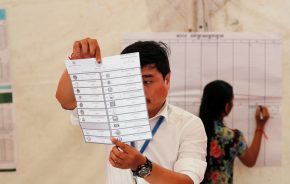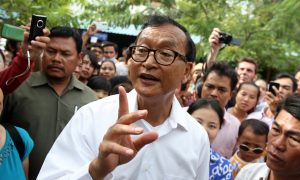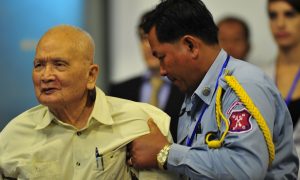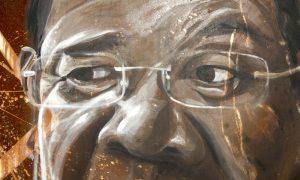សូមចុចត្រង់នេះដើម្បីអានអត្ថបទជាភាសាខ្មែរ
In January, Cambodian Prime Minister Hun Sen marks 35 years in power, making him the world’s longest-serving current Prime Minister. Cambodia’s strongman shows no sign of loosening his grip on power any time soon. This begs the question: How does he maintain control?
A prodigious literature on Cambodian politics points to multiple factors that contribute to Hun Sen’s enduring rule: his leadership personality and political nous, political networks, development aid, state violence, Chinese support, and control over natural resources, among others. Intertwined with understanding these factors, a focus on emotions—or the affective dimensions of politics—offers an important, though often overlooked, lens to analyse state power.
Land and political power
I’ve come slowly to a focus on affective politics through ten years of research on land relations in rural Cambodia. Understanding the land sector in Cambodia tells us a lot about the affective dimensions of state power. Cambodia’s political elite have long depended on land to gain and maintain political control.
During the conflict era of the 1970s, the Khmer Rouge collectivised all land under state control; then, in the post-conflict period, the ruling party consolidated power by allocating land and mining concessions to politico-business people who financed their campaigns. These land transfers have incited fear and effected widespread social and ecological dislocation. In my conversations with rural Cambodians, I am often struck by the uncertainty people express about the future as they struggle to hold onto their land and to look after their families.
In my forthcoming book, “Unwritten Rule”, I look at how rural people’s feelings of uncertainty are produced in part through the performative politics of the Cambodian political elite in conjunction with global capital. Central to Hun Sen’s power is his use of informal politics, or what I term ‘unwritten rules’—ambiguous legal directives, secretive, informal politics, and unexpected oral pronouncements—that enables the political elite to rapidly shift policy. Maintaining a shroud of uncertainty over land and natural resource deals has essentially enabled the state to give land away to supporters when politically expedient.
For the state elite, land deals bring in a flow of money to ruling party coffers that the party can use to fund infrastructure, services and material gifts that help to maintain public loyalty. For rural people, particularly those living in the land conflict-ridden upland areas, this system of unwritten rules means they never feel completely secure in their hold on their land.
Development agencies and the Cambodian government have attempted to rectify tenure insecurity through issuing formal land titles to rural families. I spent two years researching the Prime Minister’s “Order 01” campaign. This nationwide policy aimed to quell rural discontent prior to the 2013 national election by sending thousands of volunteers around the country to excise land from agribusiness concessions and title the land in the names of smallholder farmers. This land titling campaign promised (in good liberal economics fashion) to provide people with tenure security and the basis of rural prosperity.
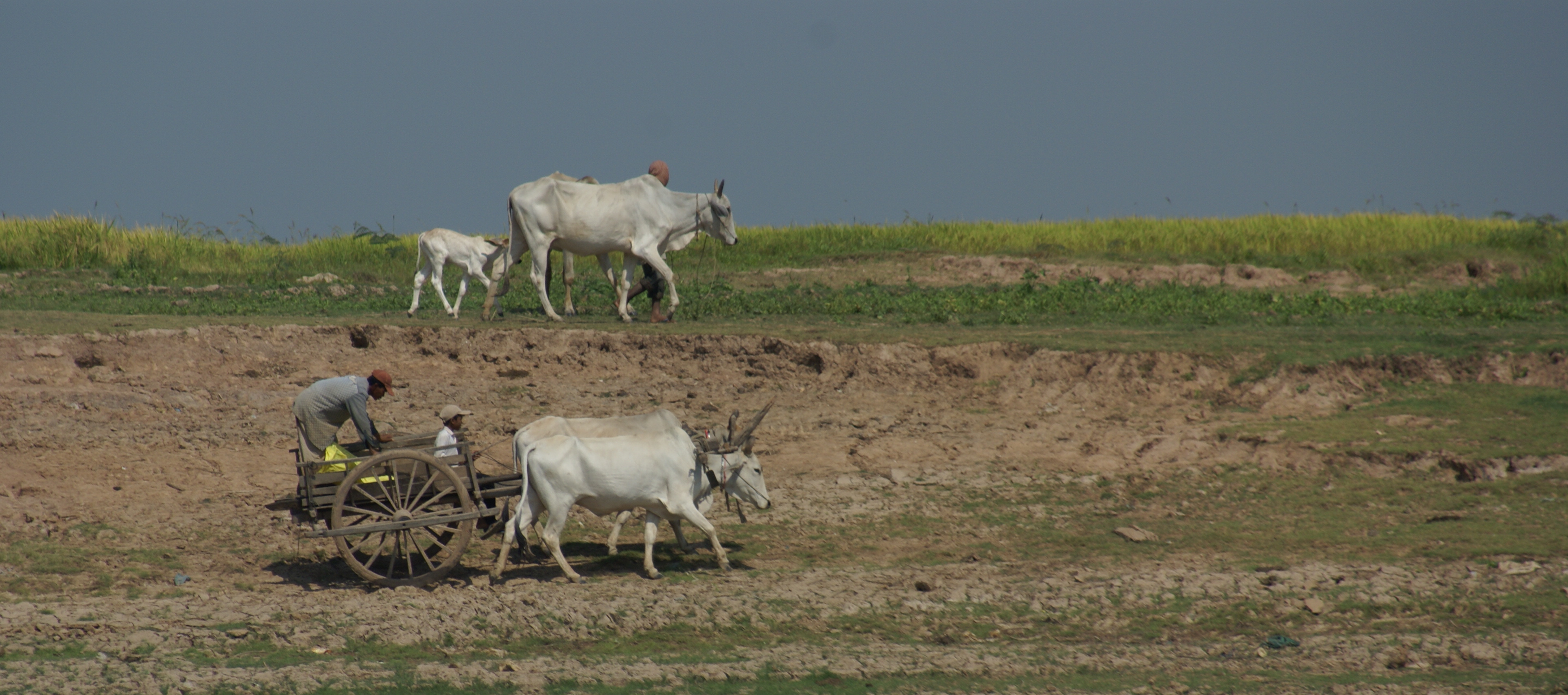
Image Credit: Alex Ch
But my survey of 270 land claimants found that many of those who received formal land titles still felt insecure. In fact, when I asked people one year after the land reform whether they were scared someone would take their land, I found no difference between those who held a title to their land and those who didn’t. Paradoxically, while liberal property reform is expected to strengthen people’s ties to bureaucratic institutions, people were more likely to value the land title because Hun Sen (personally) gave it to them. We can only understand this puzzle if we recognise the affective dimension of Cambodian politics, specifically the politics of uncertainty.
The politics of uncertainty
I use the idea of uncertainty to understand political practice and its effects in three broad senses. First, Cambodian state actors produce uncertainty over the people and processes involved in governance through opaque, ‘off the books’ political practices. In other work, I’ve called this the ‘power of informality’. This aspect of state practice is of course not confined to Cambodia; a burgeoning social science literature recognises that the ability to withhold information and produce ignorance and murkiness is an integral element of political power (this study of ignorance even has a name: agnotology).
In the Cambodian land sector, state officials go to great lengths to maintain secrecy over who is involved in land deals and what the details of the deals are. Maps and promised studies of the land sector are rarely made public, and rural people who seek information tell me they are often met with silences, obfuscation and bureaucratic delay.
The production of uncertainty can be seen in the ‘Order 01’ land titling reform. Over two years of ethnographic research in Western Cambodia observing the roll-out of this policy, I found that rules were unclear and implementation was secretive and uncertain.
The Prime Minister’s oral pronouncements often trumped written rules, leaving policy makers scrambling to issue new legal documents. In total, the central state wrote more than 200 policy and procedure documents to facilitate the land reform, a number unparalleled in the government’s thirty years of rule. On the ground, confusion over the process facilitated elite capture of land by those who already had political power and wealth.
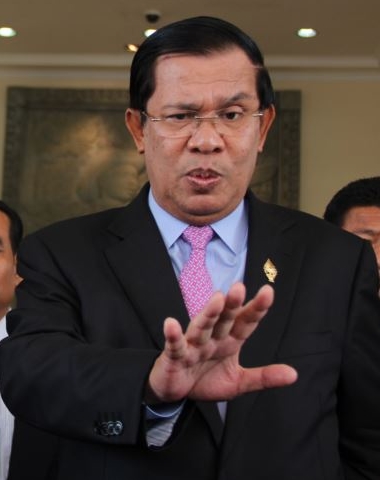
Image Credit: Nov Povleakhena
Uncertainty is also a temporal phenomenon: the uncertain potential for the state to deliver ‘gifts’ of development and prosperity, or conversely, to deliver punishment and violence. This ‘potentiality’ of state power is also noted in other Southeast Asian contexts, such as Laos. Rural people I talk with often complain of being abandoned by the state, and they are fearful of state retribution if they speak out against land grabbing and corruption (although they are never sure exactly what action will get them into trouble).
This uncertainty over state violence encourages self-discipline, as people fear possible retribution for any actions that may be deemed anti-government, and they make sure to stand well inside the line of acceptable behaviour. The recent state crackdown on civil society and opposition politics prior to the 2018 national election shows that the potential for state violence lurks close to the surface. But the regime continues to carry support through the promise that abandonment is not total. Some people do receive state protection. Sometimes state officials arrive to distribute food rations, toilets, land plots, a health clinic, infrastructure, often provided as personal ‘gifts’ from the CPP to communities who demonstrate loyal support for the party.
Where in the world is Cambodia?
The international community needs to take seriously the scepticism of many Cambodians about its intentions.
During the Order 01 land reform, for example, many people’s land was surveyed prior to the election but when the election rolled around, people had not yet received their land titles. Some told me they thought they would only receive the title if they voted for the ruling party. It is this potential for state protection and prosperity—alongside state surveillance and occasional violent repression—that is so important in encouraging people to remain loyal.
It’s important to recognise that uncertainty is not always deliberately produced; it can also be due to ineptitude and simply to chance. In a recent study of uncertainty in the hydropower industry, Jerome Whitington suggests that uncertainty is “part tactics, part negotiation, part due to chance and part due to lack of resources”.
In Cambodia, much of the state bureaucracy is staffed by people who gained their positions through family connections, rather than those with the most relevant skills, which makes governance difficult and can lead to mistakes on the ground. Even competent civil servants must make decisions where political calculus is the over-riding factor. The flexibility enabled by performative speeches and oral decision making also lends the regime a tendency towards reactive, rapidly changing policies in order to conceal immediate problems, which can lead to a confusing flurry of policy changes from central government.
In the Order 01 land reform, the state recruited thousands of student volunteers to travel across the country surveying land, providing them with just three days training, a uniform, and a GPS unit. With minimal time and equipment, surveyors abandoned some areas when the weather was bad and streams got too high to cross, so some areas were simply missed. What’s more, in my interviews with these volunteer surveyors, some told me they never learned how to operate the GPS units properly. One twenty-two year old university student admitted that he didn’t know where the ‘delete’ button was on the unit, so if he entered an incorrect unit, this mistake stayed in the system and he just had to keep going.
“The land title matters because Hun Sen gave it to us”
It’s not surprising that with these constantly changing policies, negotiations and mistakes on the ground, land reform outcomes in Cambodia are incredibly diverse. In my survey of 270 land claimants in Western Cambodia, forty percent of people who tried to claim land during the Order 01 campaign said they did not have any land surveyed. Many people whose land was surveyed received a title to only some of the land. When I followed up in early 2019, I found that some people never received the land titles they were waiting for. What’s more, even though development agencies suggest that the possession of a land title should provide people with tenure security, land title recipients told me they still did not feel fully secure in their tenure, they are scared of the companies and state officials, and they cannot access the state institutions that administer land titles and adjudicate disputes.
It’s important to realise, though, that rural Cambodians do value the land title. When I asked what the title meant to them, most people answered, “it means we can get a loan”, or, even more common: “it matters because Hun Sen gave it to us”. This latter response is striking. Land title recipients didn’t have much faith in the bureaucratic process, but they saw the title as a gift from Hun Sen that tied them more tightly to the Prime Minister’s personal protection.
This potential for the land title to increase Hun Sen’s personal power was vividly demonstrated to me when a group of farmers who received land titles in the land reform learned that a new irrigation development project was slated to run straight through their rice fields. The farmers were scared they would lose their land. They approached their local officials and company management for help, but got no response. In desperation, they marched all the way to the capital city to protest. They spent three days protesting outside Hun Sen’s residence, holding their land titles aloft and demanding the Prime Minister’s intervention. The police eventually chased them away, but the farmers did later manage to secure some compensation for their land. (Was this due to Hun Sen’s intervention? Who knows. But the farmers certainly thought so.) For these farmers, liberal private property reform offered the possibility of solving land disputes through individual appeal to the Prime Minister rather than access to bureaucratic state protection.
Understanding the role of emotions in politics
At a moment when nationalist, authoritarian politics is gaining ascendency around the globe, the experiences of Cambodia’s enduring leadership can shed light on how leaders build and retain power. Contemporary populist politics shore up exclusionary and even violent political power, while offering selective progressive policies. This rise of authoritarian-style politics necessitates the development of new strategies by scholars and activists to understand and respond to these shifts.
My examination of the affective dimension of Hun Sen’s rule suggests that scholars must go beyond analysing strongman leaders as (only) repressive, to recognising the specific ways in which they seek to maintain legitimacy by sowing uncertainty amongst the population.
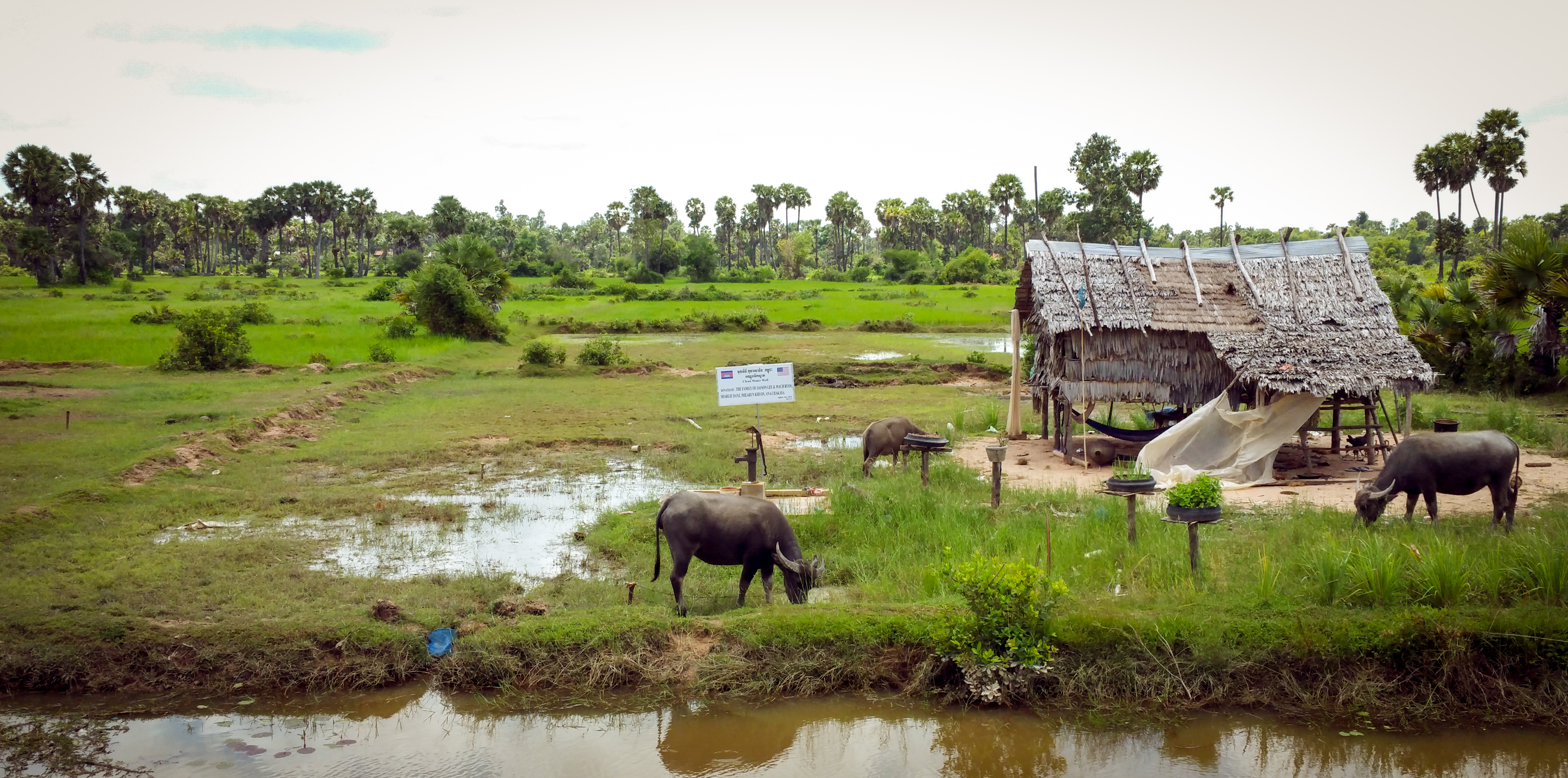
Image Credit: Tomscoffin
គិតត្រឹមខែមករា លោកនាយករដ្ឋមន្រ្តី ហ៊ុន សែន បានកាន់អំណាចអស់រយៈពេល ៣៥ ឆ្នាំដែលធ្វើឱ្យលោកក្លាយជានាយករដ្ឋមន្រ្តីបច្ចុប្បន្នដែលកាន់តំណែងយូរជាងគេបំផុតលើពិភពលោក។ បុរសខ្លាំងរបស់កម្ពុជាមិនបានបង្ហាញសញ្ញានៃការបន្ធូរបន្ថយអំណាចរបស់ខ្លួននៅពេលឆាប់ៗនោះទេ។ ចំណុចនេះធ្វើឱ្យមានសំណួរថា៖ តើគាត់រក្សាការគ្រប់គ្រងបានយ៉ាងដូចម្តេច?
កំណត់ត្រានយោបាយគួរឱ្យកត់សម្គាល់នៅកម្ពុជាចង្អុលបង្ហាញពីកត្តាជាច្រើនដែលរួមចំណែកដល់ការគ្រប់គ្រងរបស់ លោក ហ៊ុន សែន ដែលមានជាអាទិ៍៖ បុគ្គលិកលក្ខណៈភាពជាអ្នកដឹកនាំរបស់គាត់ និងភាពឈ្លាសវៃផ្នែកនយោបាយ, បណ្តាញនយោបាយ,ជំនួយអភិវឌ្ឍន៍, អំពើហិង្សារបស់រដ្ឋ, ការគាំទ្ររបស់ចិននិងការគ្រប់គ្រងលើធនធានធម្មជាតិជាដើម។ បន្ថែមលើកត្តាទាំងនេះ ការផ្តោតអារម្មណ៍លើសញ្ចេតនាឬទិដ្ឋភាពដ៏មានឥទ្ធិពលនៃនយោបាយផ្តល់នូវកែវពង្រីកដ៏សំខាន់ ដែលត្រូវបានគេមើលរំលងជារឿយៗដើម្បីវិភាគអំណាចរបស់រដ្ឋ។
ដីធ្លីនិងអំណាចនយោបាយ
ខ្ញុំផ្តោតការយកចិត្តទុកដាក់បន្តិចម្តងៗទៅលើនយោបាយដែលមានឥទ្ធិពលតាមរយៈការស្រាវជ្រាវរយៈពេល ១០ ឆ្នាំទាក់ទងនឹងរឿងដីធ្លីនៅជនបទនៅប្រទេសកម្ពុជា។ ការយល់ដឹងអំពីវិស័យដីធ្លីនៅកម្ពុជាប្រាប់យើងយ៉ាងច្រើនអំពីទិដ្ឋភាពដ៏មានឥទ្ធិពលនៃអំណាចរដ្ឋ។ ឥស្សរជននយោបាយនៅកម្ពុជាបានពឹងផ្អែកជាយូរមកហើយលើដីធ្លីដើម្បីទទួលបាននិងរក្សាការគ្រប់គ្រងនយោបាយ។
ក្នុងអំឡុងសម័យជម្លោះក្នុងទសវត្សរ៍ ១៩៧០ ខ្មែរក្រហមបានប្រមូលដីទាំងអស់ឱ្យស្ថិតនៅក្រោមការគ្រប់គ្រងរបស់រដ្ឋ។ បន្ទាប់មកនៅក្នុងរយៈពេលក្រោយជម្លោះគណបក្សកាន់អំណាចបានបង្រួបបង្រួមអំណាចដោយបែងចែកដីសម្បទាននិងរ៉ែដល់អ្នកជំនួញនយោបាយដែលបានផ្តល់ថវិកាដល់យុទ្ធនាការរបស់ពួកគេ។ ការផ្ទេរដីធ្លីទាំងនេះបានបង្កឱ្យមានការភ័យខ្លាចនិងជះឥទ្ធិពលដល់ការផ្លាស់ទីលំនៅរបស់សង្គមនិងប្រព័ន្ធអេកូឡូស៊ី។ នៅក្នុងការសន្ទនារបស់ខ្ញុំជាមួយប្រជាជនខ្មែរនៅតាមជនបទ ខ្ញុំតែងឆ្ងល់នៅពេលដែលប្រជាជនលើកឡើងពីភាពមិនច្បាស់លាស់អំពីអនាគតនៅពេលពួកគេតស៊ូដើម្បីកាន់កាប់ដីធ្លីរបស់ពួកគេនិងមើលថែរក្សាគ្រួសាររបស់ខ្លួន។
នៅក្នុងសៀវភៅរបស់ខ្ញុំដែលនឹងចេញផ្សាយនៅពេលខាងមុខដែលមានចំណងជើងថា“វិធានការមិនលាយលក្ខណ៍អក្សរ” ខ្ញុំសិក្សាពីអារម្មណ៍នៃភាពមិនប្រាកដប្រជារបស់ប្រជាជននៅតាមជនបទដែលបានកើតឡើងដោយសារតែការធ្វើនយោបាយបែបសម្តែងរបស់ឥស្សរជននយោបាយខ្មែរ ជាមួយនឹងដើមទុនពិភពលោក។ ស្នូលនៃអំណាចរបស់លោកហ៊ុន សែន គឺការប្រើប្រាស់នយោបាយក្រៅផ្លូវការឬអ្វីដែលខ្ញុំហៅថា “វិធានការមិនមែនលាយលក្ខណ៍អក្សរ – សេចក្តីណែនាំច្បាប់ដែលមិនច្បាស់លាស់, មានអាថ៌កំបាំង,នយោបាយមិនផ្លូវការ និងការប្រកាសផ្ទាល់មាត់ដែលមិននឹកស្មានដល់” ដែលធ្វើឱ្យឥស្សរជននយោបាយផ្លាស់ប្តូរគោលនយោបាយយ៉ាងឆាប់រហ័ស។ ការរក្សាភាពមិនច្បាស់លាស់នៃកិច្ចព្រមព្រៀងដីធ្លីនិងធនធានធម្មជាតិបានជួយឱ្យរដ្ឋផ្តល់ដីដល់អ្នកគាំទ្រនៅពេលដែលមាននិន្នាការនយោបាយ។
សម្រាប់ឥស្សរជនរដ្ឋ, កិច្ចព្រមព្រៀងដីធ្លីនាំមកនូវលំហូរថវិកាដល់មន្រ្តីគណបក្សកាន់អំណាចដែលគណបក្សអាចប្រើប្រាស់ដើម្បីចំណាយលើហេដ្ឋារចនាសម្ព័ន្ធ, សេវាកម្ម និងអំណោយជាសម្ភារៈដែលជួយរក្សាភាពស្មោះត្រង់របស់សាធារណៈជន។ សម្រាប់ប្រជាជននៅតំបន់ជនបទជាពិសេសអ្នករស់នៅតំបន់ខ្ពង់រាបដែលមានជម្លោះដីធ្លីប្រព័ន្ធនៃវិធានការមិនមែនលាយលក្ខណ៍អក្សរនេះ មានន័យថាពួកគេមិនដែលមានអារម្មណ៍ថាមានសុវត្ថិភាពទាំងស្រុងក្នុងការកាន់កាប់ដីរបស់ខ្លួនឡើយ។
ទីភ្នាក់ងារអភិវឌ្ឍន៍និងរដ្ឋាភិបាលកម្ពុជាបានព្យាយាមកែលម្អអសន្តិសុខសិទ្ធិកាន់កាប់ដីធ្លីតាម រយៈការចេញប័ណ្ណកម្មសិទ្ធិដីធ្លីជាផ្លូវការដល់គ្រួសារជាច្រើននៅជនបទ។ ខ្ញុំបានចំណាយពេល ២ ឆ្នាំស្រាវជ្រាវយុទ្ធនាការ “បទបញ្ជា ០១” របស់នាយករដ្ឋមន្ត្រី។គោលនយោបាយទូទាំងប្រទេសនេះមានគោលបំណងបំបាត់ការមិនសប្បាយចិត្តនៅតាមជនបទ មុនការបោះឆ្នោតជាតិឆ្នាំ ២០១៣ ដោយបញ្ជូនអ្នកស្ម័គ្រចិត្តរាប់ពាន់នាក់នៅទូទាំង ប្រទេសទៅដកហូតដីពីដីសម្បទានសេដ្ឋកិច្ចនិងផ្តល់ប័ណ្ណកម្មសិទ្ធិដីធ្លីឱ្យកសិករតូចតាច។ យុទ្ធនាការផ្តល់ប័ណ្ណកម្មសិទ្ធិដីធ្លីនេះបានសន្យា (តាមបែបសេដ្ឋកិច្ចសេរីល្អ) ដើម្បីផ្តល់ឱ្ យប្រជាជននូវសន្តិសុខសិទ្ធិកាន់កាប់ដីធ្លីនិងមូលដ្ឋាននៃភាពរុងរឿងនៅជនបទ។
ប៉ុន្តែការស្ទង់មតិរបស់ខ្ញុំជាមួយអ្នកទាមទារដីធ្លីចំនួន ២៧០ នាក់បានរកឃើញថាភាគច្រើននៃអ្នកដែលបានទទួលប័ណ្ណកម្មសិទ្ធិដីធ្លីនៅតែមានអារម្មណ៍ថាមិនមានសុវត្ថិភាព។ តាមពិតនៅពេលខ្ញុំសួរប្រជាជនមួយឆ្នាំបន្ទាប់ពីកំណែទម្រង់ដីធ្លីថាតើពួកគេខ្លាចនរណាម្នាក់យកដីរបស់ពួកគេឬទេ ខ្ញុំមិនបានរកឃើញថាមានភាពខុសគ្នារវាងអ្នកដែលកាន់ប័ណ្ណកម្មសិទ្ធិដីធ្លីរបស់ពួកគេនិងអ្នកដែលមិនមាននោះឡើយ។ ផ្ទុយពីនេះនៅពេលដែលការកែទម្រង់អចលនទ្រព្យសេរីត្រូវបានគេរំពឹងថានឹងពង្រឹងចំណងទាក់ទងរបស់ប្រជាជនទៅនឹងស្ថាប័នការិយាធិបតេយ្យ, ប្រជាជនទំនងជាឱ្យតម្លៃប័ណ្ណកម្មសិទិ្ធដីធ្លីពីព្រោះលោកហ៊ុន សែន បានផ្តល់ប័ណ្ណកម្មសិទិ្ធដីធ្លីឱ្យពួកគេ(ដោយផ្ទាល់)។ យើងអាចត្រឹមតែយល់បានតែពីបញ្ហានេះប្រសិនបើយើងទទួលស្គាល់ពីទិដ្ឋភាពដ៏មានឥទ្ធិពលនៃនយោបាយកម្ពុជាជាពិសេសនយោបាយនៃភាពមិនប្រាកដប្រជា។
នយោបាយនៃភាពមិនប្រាកដប្រជា
ខ្ញុំប្រើប្រាស់គំនិតនៃភាពមិនប្រាកដប្រជាដើម្បីយល់ពីការអនុវត្តនយោបាយនិងផលប៉ះពាល់ របស់វានៅក្នុងន័យទូលំទូលាយបីយ៉ាង។ទីមួយតួអង្គរដ្ឋកម្ពុជាបង្កើតឱ្យមានភាពមិន ប្រាកដ ប្រជាលើប្រជាជននិងដំណើរការពាក់ព័ន្ធនឹងអភិបាលកិច្ចតាមរយៈភាពស្រអាប់ “ក្រៅបញ្ជី” “ការអនុវត្តនយោបាយ”។ និយាយម្យ៉ាងទៀត ខ្ញុំបានហៅការអនុវត្តបែបនេះថា “អំណាចនៃភាពមិនផ្លូវការ”។ ទិដ្ឋភាពនេះនៃការអនុវត្តរបស់រដ្ឋជាការពិតមិនមែន មាននៅតែប្រទេសកម្ពុជាទេ ទ្រឹស្តីវិទ្យាសាស្ត្រសង្គមទាក់ទងនឹងការអភិវឌ្ឍទទួលស្គាល់ ថាសមត្ថភាពក្នុងការលាក់ព័ត៌មាននិងបង្កើតភាពល្ងង់ខ្លៅនិងភាពរអាក់រអួលគឺជា ធាតុសំខាន់នៃអំណាចនយោបាយ (ការសិក្សាអំពីភាពល្ងង់ខ្លៅនេះមានឈ្មោះថា អវិជ្ជាវិទ្យា)។
នៅក្នុងវិស័យដីធ្លីនៅកម្ពុជា មន្រ្តីរដ្ឋខិតខំប្រឹងប្រែងដើម្បីរក្សាការសម្ងាត់ថាតើនរណា ពាក់ព័ន្ធនឹងរឿងដីធ្លី ហើយថាតើព័ត៌មានលម្អិតនៃរឿងនោះមានអ្វីខ្លះ។ ផែនទីនិងការសិក្សាអំពីវិស័យដីធ្លីកម្រត្រូវបានផ្សព្វផ្សាយជាសាធារណៈណាស់ ហើយ ប្រជាជននៅជនបទដែលស្វែងរកព័ត៌មានប្រាប់ខ្ញុំថាពួកគេច្រើនតែទទួលបានគឺ ការស្ងៀមស្ងាត់ ភាពងងឹតងងល់ និងការពន្យាពេលបែបការិយាធិបតេយ្យ។
ការបង្កើតភាពមិនប្រាកដប្រជាអាចត្រូវបានគេមើលឃើញនៅក្នុងការកែទម្រង់ប័ណ្ណ កម្មសិទ្ធិដីធ្លី “បទបញ្ជា ០១”។ អស់រយៈពេលជាងពីរឆ្នាំនៃការស្រាវជ្រាវបែបនរវិទ្យា នៅភាគខាងលិចនៃប្រទេសកម្ពុជាដោយការសង្កេតការអនុវត្តគោលនយោបាយនេះ, ខ្ញុំបានរកឃើញថាវិធានការមិនច្បាស់លាស់ ហើយការអនុវត្តមានលក្ខណៈអាថ៌កំបាំងនិង មិនប្រាកដប្រជា។
ការប្រកាសជាសាធារណៈដោយផ្ទាល់មាត់របស់នាយករដ្ឋមន្រ្តីតែងតែបន្លឺឡើងនូវវិធានការ លាយលក្ខណ៍អក្សរជាហេតុធ្វើឱ្យអ្នកធ្វើគោលនយោបាយមិនហ៊ានចេញឯកសារច្បាប់ថ្មីឡើយ។ ជារួមមករដ្ឋបានតាក់តែងឯកសារគោលនយោបាយនិងនីតិវិធីជាង ២០០ ដើម្បីសម្រួល ដល់ការកែទម្រង់ដីធ្លីដែលជាចំនួនដែលមិនមាននៅក្នុងច្បាប់គ្រប់គ្រងក្នុងរយៈពេលសាមសិប ឆ្នាំរបស់រដ្ឋាភិបាល។ ជាក់ស្តែង, ភាពមិនច្បាស់លាស់នៃដំណើរការនេះបានជួយសម្រួលដល់ ការកាន់កាប់ដីធ្លីដោយពួកអ្នកដែលមានអំណាចនយោបាយនិងទ្រព្យសម្បត្តិរួចហើយ។
ភាពមិនប្រាកដប្រជាក៏ជាបាតុភូតបណ្តោះអាសន្នផងដែរ៖ សក្តានុពលមិនច្បាស់លាស់ សម្រាប់រដ្ឋក្នុងការផ្តល់អំណោយនៃការអភិវឌ្ឍន៍និងភាពរុងរឿង ឬផ្ទុយទៅវិញដើម្បី ដាក់ទណ្ឌកម្មនិងអំពើហិង្សា។ “សក្តានុពល” នៃអំណាចរដ្ឋនេះត្រូវបានកត់សម្គាល់នៅក្នុង បរិបទអាស៊ីអាគ្នេយ៍ផ្សេងទៀតដូចជាប្រទេសឡាវ។ ប្រជាជននៅតាមជនបទដែលខ្ញុំ និយាយជាមួយជារឿយៗត្អូញត្អែរថាពួកគេត្រូវបានរដ្ឋបោះបង់ចោល ហើយពួកគេភ័យខ្លាច ការសងសឹករបស់រដ្ឋប្រសិនបើពួកគេនិយាយប្រឆាំងនឹងការរំលោភដីធ្លីនិងអំពើពុករលួយ (ទោះបីជាពួកគេមិនច្បាស់ថាតើសកម្មភាពអ្វីដែលនឹងធ្វើឱ្យពួកគេមានបញ្ហានោះក៏ដោយ)។
ភាពមិនប្រាកដប្រជានេះចំពោះអំពើហិង្សារបស់រដ្ឋជំរុញឱ្យមានស្វ័យវិន័យនៅពេលដែលប្រជាជនភ័យខ្លាចការសងសឹកដែលអាចកើតមានចំពោះសកម្មភាពណាមួយដែលអាចត្រូវបានគេចាត់ទុកថាជាការប្រឆាំងនឹងរដ្ឋាភិបាល ហើយពួកគេត្រូវប្រាកដថាបានឈរនៅខាងក្នុងឥរិយាបថដែលគេអាចទទួលយកបាន។ ការបង្ក្រាបថ្មីៗរបស់រដ្ឋទៅលើសង្គមស៊ីវិលនិងនយោបាយប្រឆាំងនៅមុនការបោះឆ្នោតជាតិឆ្នាំ ២០១៨ បង្ហាញថាសក្តានុពលនៃអំពើហិង្សារបស់រដ្ឋអាចកើតមានឡើង។ ប៉ុន្តែរបបនេះនៅតែបន្តការគាំទ្រតាមរយៈការសន្យាថាការបោះបង់ចោលគឺមិនទាំងអស់ឡើយ។ អ្នកខ្លះពិតជាទទួលបានការការពារពីរដ្ឋ។ ពេលខ្លះមន្រ្តីរដ្ឋមកដល់ចែកគ្រឿងបរិភោគ, បង្គន់, ដីឡូត៍, គ្លីនិកសុខភាព, ហេដ្ឋារចនាសម្ព័ន្ធដែលតែងតែផ្តល់ជាអំណោយផ្ទាល់ខ្លួនពីគណបក្សប្រជាជនកម្ពុជាដល់សហគមន៍ដែលបង្ហាញការគាំទ្រស្មោះត្រង់ចំពោះគណបក្ស។
ឧទាហរណ៍ក្នុងការកែទម្រង់ដីធ្លី បទបញ្ជា ០១ ប្រជាពលរដ្ឋជាច្រើនត្រូវបានគេធ្វើការស្ទាបស្ទង់មតិមុនពេលបោះឆ្នោតប៉ុន្តែនៅពេលដែលការបោះឆ្នោតបានបញ្ចប់ ប្រជាជនមិនទាន់បានទទួលប័ណ្ណកម្មសិទ្ធិដីធ្លីនៅឡើយទេ។ អ្នកខ្លះប្រាប់ខ្ញុំថាពួកគេគិតថាពួកគេនឹងទទួលបានប័ណ្ណកម្មសិទ្ធិ ប្រសិនបើពួកគេបោះឆ្នោតឱ្យគណបក្សកាន់អំណាច។ នេះគឺជាសក្តានុពលសម្រាប់ការការពារនិងភាពរុងរឿងរបស់រដ្ឋ រួមជាមួយការឃ្លាំមើលរបស់រដ្ឋនិងការបង្ក្រាបដោយហិង្សាម្តងម្កាល ដែលមានសារៈសំខាន់ណាស់ក្នុងការលើកទឹកចិត្តប្រជាជនឱ្យរក្សាភាពស្មោះត្រង់ចំពោះខ្លួន។
វាមានសារៈសំខាន់ណាស់ក្នុងការទទួលស្គាល់ថាភាពមិនប្រាកដប្រជាមិនមែនតែងតែត្រូវបានបង្កើតឡើងដោយចេតនានោះទេ។ វាក៏អាចបណ្តាលមកពីអសមត្ថភាពនិងគ្រាន់តែដើម្បីឱកាស។ នៅក្នុងការសិក្សានាពេលថ្មីៗនេះអំពីភាពមិនប្រាកដប្រជានៅក្នុងឧស្សាហកម្មវារីអគ្គិសនី Jerome Whitington បានលើកឡើងថាភាពមិនប្រាកដប្រជាគឺជា“ ចំណែកមួយនៃតាក់ទិក, ចំណែកមួយនៃការចរចា, ផ្នែកមួយនៃភាពចៃដន្យ និងចំណែកមួយនៃកង្វះធនធាន”។
នៅកម្ពុជាការិយាល័យធិបតេយ្យរដ្ឋភាគច្រើនត្រូវបានកាន់កាប់ដោយមនុស្សដែលទទួលបាន មុខតំណែងតាមរយៈទំនាក់ទំនងគ្រួសារជាជាងអ្នកដែលមានជំនាញពាក់ព័ន្ធបំផុតដែលធ្វើ ឱ្យអភិបាលកិច្ចមានការលំបាកនិងអាចនាំឱ្យមានកំហុសជៀសមិនផុតឡើយ។ សូម្បីតែ មន្ត្រីរាជការដែលមានសមត្ថភាពខ្ពស់ក៏ត្រូវតែធ្វើការសម្រេចចិត្តដោយផ្អែកលើកត្តានយោបាយ ដែរ។ ភាពបត់បែនតាមរយៈសុន្ទរ-កថាបែបសម្តែងនិងការធ្វើសេ ចក្តីសម្រេច ចិត្តផ្ទាល់មាត់ក៏ធ្វើឱ្យរបបនេះមាននិន្នាការឆ្ពោះទៅរកគោលនយោបាយដែលមានលក្ខណៈ ប្រតិកម្មនិងផ្លាស់ប្តូរគោលនយោបាយយ៉ាងឆាប់រហ័សដើម្បីលាក់បាំងបញ្ហាកើតមានដែល អាចនាំឱ្យមានភាពច្របូកច្របល់នៃការផ្លាស់ប្តូរគោលនយោបាយពីរដ្ឋាភិបាលថ្នាក់ កណ្តាល។
នៅក្នុងការកែទម្រង់ដីធ្លី បទបញ្ជា ០១ រដ្ឋបានជ្រើសរើសនិស្សិតស្ម័គ្រចិត្តរាប់ពាន់នាក់ ដើម្បីធ្វើដំណើរទូទាំងប្រទេសដោយធ្វើការវាស់វែងដីធ្លីដោយផ្តល់ឱ្យពួកគេនូវ ការបណ្តុះបណ្តាលរយៈពេលតែ ៣ ថ្ងៃ ឯកសណ្ឋាន និងឧបករណ៍ GPS។ ជាមួយនឹង ពេលវេលានិងឧបករណ៍តិចតួចអ្នកវាស់វែងបានបោះ បង់ចោលតំបន់ខ្លះនៅពេល អាកាសធាតុមិនល្អហើយទឹកហូរឡើងខ្ពស់ពេកពិបាកឆ្លងកាត់ ដូច្នេះតំបន់ខ្លះមិនត្រូវបាន វាស់វែងឡើយ។ លើសពីនេះទៅទៀតនៅក្នុងបទសម្ភាសន៍របស់ខ្ញុំជាមួយអ្នកវាស់វែង ដីស្ម័គ្រចិត្តទាំងនេះអ្នកខ្លះបានប្រាប់ខ្ញុំថាពួកគេមិនដែលរៀនពីរបៀបប្រើប្រាស់ GPS ឱ្យបានត្រឹមត្រូវទេ។ និស្សិតសាកលវិទ្យាល័យម្នាក់អាយុ ២២ ឆ្នាំបានសារភាពថាគាត់មិន ដឹងកន្លែងចុចប៊ូតុង ‘លុប’ នៅលើឧបករណ៍ឡើយ ដូច្នេះប្រសិនបើគាត់ប្រើប្រាស់ឧបករណ៍ មិនបានត្រឹមត្រូវកំហុសកើតមាននៅក្នុងប្រព័ន្ធហើយគាត់ត្រូវតែបន្តការងារទៅមុខទៀត។
“ប័ណ្ណកម្មសិទ្ធិដីធ្លីមានសារសំខាន់ពីព្រោះ លោក ហ៊ុន សែន បានប្រគល់ឱ្យយើង”
វាមិនមែនជារឿងគួរឱ្យភ្ញាក់ផ្អើលឡើយចំពោះការផ្លាស់ប្តូរគោលនយោបាយឥតឈប់ឈរការចរចារ និងកំហុសជាក់ស្តែងទាំងនេះ កំណែទម្រង់ដីធ្លីនៅកម្ពុជាមានភាពចម្រុះមិនគួរឱ្យជឿ។ នៅក្នុងការស្ទង់មតិរបស់ខ្ញុំជាមួយអ្នកទាមទារដីធ្លីចំនួន ២៧០នាក់នៅភាគខាងលិចប្រទេសកម្ពុជាបានបង្ហាញថា ប្រជាជនសែសិបភាគរយដែលបានព្យាយាមទាមទារដីក្នុងអំឡុងពេលយុទ្ធនាការបទបញ្ជា ០១ បាននិយាយថាពួកគេមិនបានទទួលការវាស់វែងដីធ្លីឡើយ។ មនុស្សជាច្រើនដែលមានដីត្រូវបានគេវាស់វែងដីធ្លីបានទទួលប័ណ្ណកម្មសិទ្ធិតែដីខ្លះប៉ុណ្ណោះ។ នៅពេលដែលខ្ញុំបានតាមដាននៅដើមឆ្នាំ ២០១៩ ខ្ញុំបានឃើញថាមនុស្សមួយចំនួនមិនដែលបានទទួលប័ណ្ណកម្មសិទ្ធិដីធ្លីដែលពួកគេកំពុងរង់ចាំឡើយ។ លើសពីនេះទៅទៀតទោះបីភ្នាក់ងារអភិវឌ្ឍន៍ស្នើថាការកាន់កាប់ប័ណ្ណកម្មសិទ្ធិដីធ្លីគួរតែផ្តល់ឱ្យប្រជាជននូវសន្តិសុខ, អ្នកកាន់កាប់ប័ណ្ណកម្មសិទ្ធិដីធ្លីជាច្រើនបានប្រាប់ខ្ញុំថាពួកគេនៅតែមិនមានអារម្មណ៍ថាមានសុវត្ថិភាពពេញលេញនៅក្នុងការកាន់កាប់ដីធ្លីរបស់ពួកគេឡើយ, ពួកគេខ្លាចក្រុមហ៊ុននិងមន្រ្តីរដ្ឋ ហើយពួកគេមិនអាចប្រាស្រ័យស្ថាប័នរដ្ឋដែលគ្រប់គ្រងប័ណ្ណកម្មសិទ្ធិដីធ្លីនិងការដោះស្រាយវិវាទបានឡើយ។
ទោះយ៉ាងណាវាជាការសំខាន់ណាស់ដែលត្រូវដឹងថាប្រជាជនកម្ពុជានៅតាមជនបទឱ្យតម្លៃប័ណ្ណ កម្មសិទិ្ធណាស់។ នៅពេលខ្ញុំសួរថាតើប័ណ្ណនោះមានន័យយ៉ាងណាចំពោះពួកគេ, មនុស្ស ភាគច្រើនបានឆ្លើយថា “វាមានន័យថាយើងអាចទទួលបានប្រាក់កម្ចី” ឬអ្វីដែលសាមញ្ញ ជាងនេះទៀតគឺ “វាសំខាន់ពីព្រោះលោក ហ៊ុន សែន ផ្តល់វាឱ្យយើង”។ ការឆ្លើយតប ចុងក្រោយនេះគួរឱ្យចាប់អារម្មណ៍ណាស់។ អ្នកទទួលប័ណ្ណកម្មសិទ្ធិដីធ្លីមិនមានជំនឿច្រើន លើដំណើរការការិយាធិបតេយ្យឡើយ ប៉ុន្តែពួកគេឃើញថាប័ណ្ណនេះជាអំណោយពីលោក ហ៊ុន សែន ដែលបានភ្ជាប់ពួកគេយ៉ាងតឹងរឹងទៅនឹងការការពារខ្លួនរបស់លោកនាយករដ្ឋមន្ត្រី។
សក្តានុពលនៃប័ណ្ណកម្មសិទ្ធិដីធ្លីនេះដើម្បីបង្កើនអំណាចផ្ទាល់ខ្លួនរបស់លោក ហ៊ុន សែនត្រូវបានបង្ហាញយ៉ាងច្បាស់ចំពោះខ្ញុំនៅពេលដែលកសិករមួយក្រុមដែលទទួលបានប័ណ្ណកម្មសិទ្ធិដីធ្លីនៅក្នុងកំណែទម្រង់ដីធ្លីបានដឹងថាគម្រោងអភិវឌ្ឍន៍ប្រព័ន្ធធារាសាស្រ្តថ្មីត្រូវបានគ្រោងដំណើរការកាត់ដីស្រែរបស់ពួកគេ។ កសិករភ័យខ្លាចថាពួកគេនឹងបាត់បង់ដីធ្លីរបស់ខ្លួន។ ពួកគេបានទៅជួបមន្រ្តីមូលដ្ឋាននិងអ្នកគ្រប់គ្រងក្រុមហ៊ុនដើម្បីសុំជំនួយ ប៉ុន្តែពួកគេមិនបានឆ្លើយតបឡើយ។ ដោយអស់សង្ឃឹមពួកគេបានធ្វើដំណើរដើម្បីតវ៉ានៅភ្នំពេញ។ ពួកគេបានចំណាយពេល ៣ ថ្ងៃធ្វើការតវ៉ានៅខាងក្រៅគេហដ្ឋានរបស់លោក ហ៊ុន សែន ដោយកាន់ប័ណ្ណកម្មសិទ្ធិដីធ្លីរបស់ពួក ហើយទាមទារសុំឱ្យមានអន្តរាគមន៍ពីលោកនាយករដ្ឋមន្រ្តី។ នៅទីបំផុតប៉ូលីសបានដេញពួកគេចេញ ប៉ុន្តែក្រោយមកកសិករបានទទួលបានសំណងខ្លះសម្រាប់ដីរបស់ពួកគេ។ (តើនេះមកពីអន្តរាគមន៍របស់លោក ហ៊ុន សែន មែនទេ? នរណាទៅដឹង។ ប៉ុន្តែកសិករពិតជាបានគិតដូច្នេះ។) សម្រាប់កសិករទាំងនេះកំណែទម្រង់ដីធ្លីឯកជនសេរីបានផ្តល់លទ្ធភាព ដោះស្រាយវិវាទដីធ្លីតាមរយៈការអំពាវនាវរបស់បុគ្គលទៅកាន់នាយករដ្ឋមន្រ្តីជាជាងការទទួលបានការការពារពីការិយាធិបតេយ្យរបស់រដ្ឋ។
ឈ្វេងយល់ពីតួនាទីនៃអារម្មណ៍នៅក្នុងនយោបាយ
នៅខណៈពេលដែលអ្នកជាតិនិយម, នយោបាយផ្តាច់ការកំពុងទទួលបានជោគជ័យនៅទូទាំងពិភពលោក បទពិសោធនៃភាពជាអ្នកដឹកនាំដែលស្ថិតស្ថេររបស់ប្រទេសកម្ពុជាអាចឆ្លុះបញ្ចាំងពីរបៀបដែលមេដឹកនាំកសាងនិងរក្សាអំណាចរបស់ខ្លួន។ នយោបាយប្រជានិយមបច្ចុប្បន្នគាំទ្រអំណាចផ្តាច់ការនិងសូម្បីតែអំពើហិង្សានយោបាយក្នុងពេលមានគោលនយោបាយជឿនលឿនតាមការជ្រើសរើស។ការកើនឡើងនៃនយោបាយបែបផ្តាច់ការនេះត្រូវការការអភិវឌ្ឍនយុទ្ធសាស្ត្រថ្មីៗដោយអ្នកប្រាជ្ញនិងសកម្មជនដើម្បីស្វែងយល់និងឆ្លើយតបចំពោះការផ្លាស់ប្តូរទាំងនេះ។ ការពិនិត្យរបស់ខ្ញុំលើទិដ្ឋភាពដ៏មានឥទ្ធិពលនៃច្បាប់របស់ហ៊ុនសែនបង្ហាញថាអ្នកសិក្សាត្រូវតែធ្វើលើសពីការវិភាគមេដឹកនាំបែបបុរសខ្លាំង (ត្រឹមតែ) ប្រើអំណាចត្រួតត្រា ដើម្បីទទួលស្គាល់មធ្យោបាយជាក់លាក់ដែលពួកគេស្វែងរកដើម្បីរក្សាភាពស្របច្បាប់ដោយសាបព្រោះភាពមិនប្រាកដប្រជាក្នុងចំណោមប្រជាជន។
Translated by Chanroeun Pa.
 Facebook
Facebook  Twitter
Twitter  Soundcloud
Soundcloud  Youtube
Youtube  Rss
Rss 